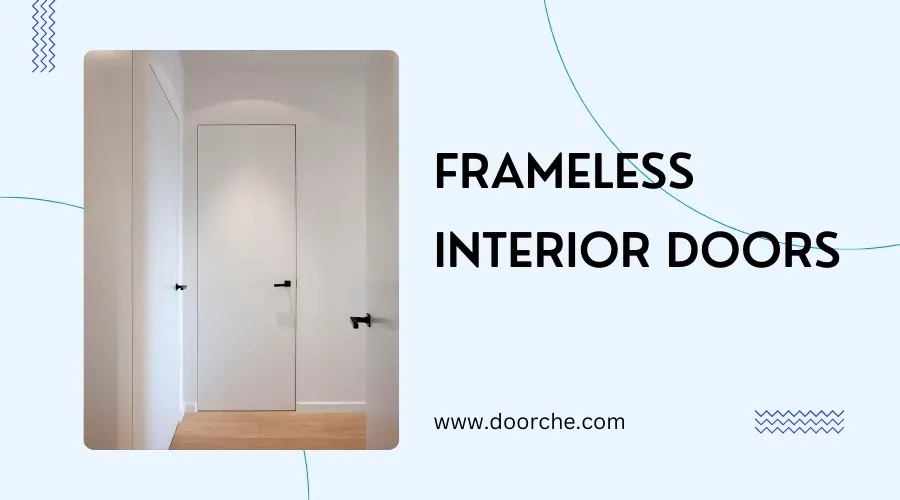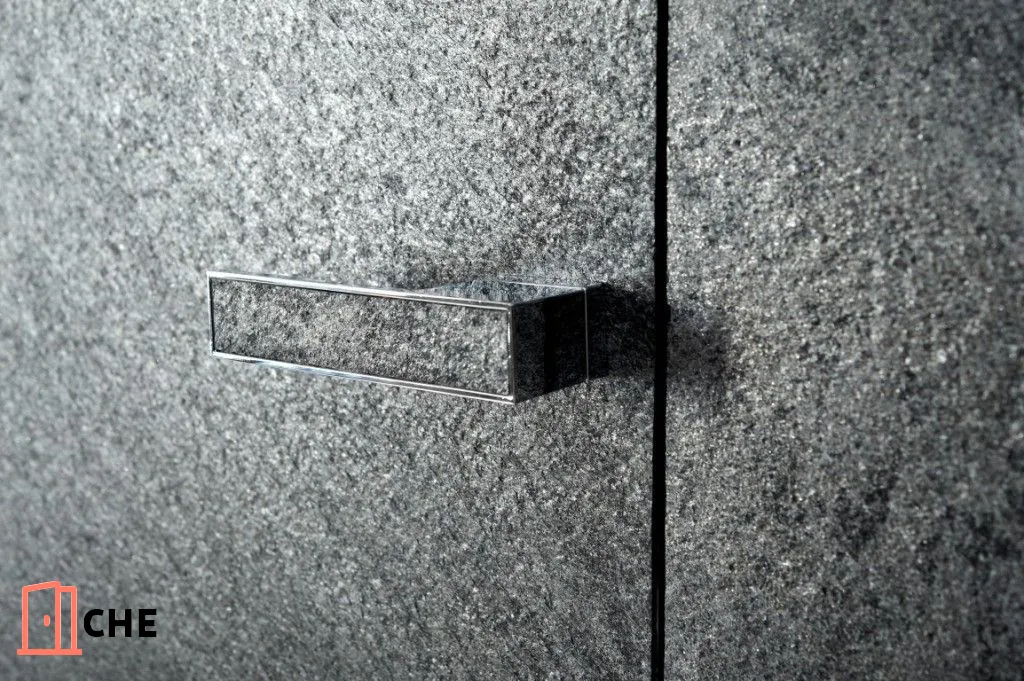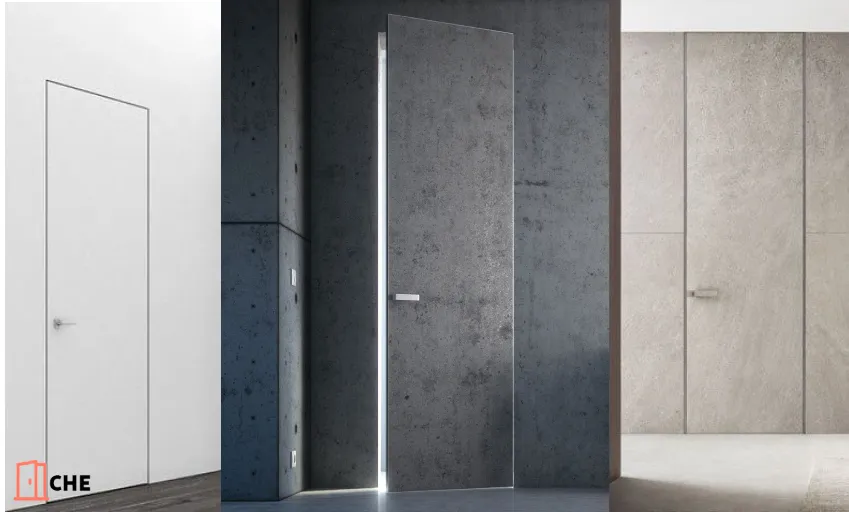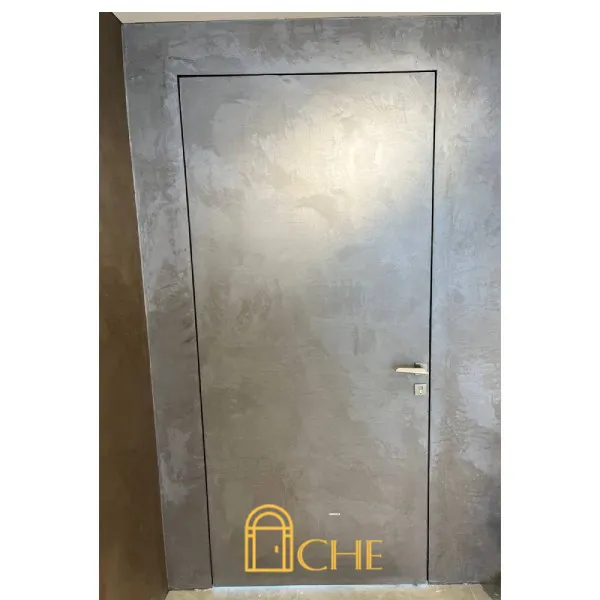Frameless interior doors have emerged as a prominent trend in modern architectural design, offering a seamless blend of functionality and aesthetic appeal. Whether you’re an interior design enthusiast or a homeowner considering an upgrade, this article will provide valuable insights into the world of frameless interior doors. Frameless interior doors, also known as seamless or invisible doors, are revolutionary door systems designed to create a minimalist and contemporary look. Unlike traditional doors, frameless doors do not have a visible door frame or casing, presenting a sleek and streamlined appearance. The absence of a frame allows the door to seamlessly integrate with the surrounding walls, making it appear as an extension of the architecture itself. These doors are often made of premium materials such as glass, wood, or metal. Glass frameless doors, in particular, have gained immense popularity due to their ability to maximize natural light flow and create an open and airy ambiance. Frameless doors can be hinged or sliding, offering flexibility in terms of functionality and space optimization. The absence of a visible frame not only enhances the aesthetics but also eliminates potential visual obstructions, giving the illusion of a larger space.

Benefits of Frameless Interior Doors
Frameless interior doors offer several benefits that make them a popular choice for modern architectural design. Here are some key advantages:
- Aesthetics: Frameless doors provide a sleek and contemporary look, seamlessly blending with the surrounding architecture. Their minimalist design enhances the overall aesthetics of a space and creates a sense of openness.
- Natural Light and Visibility: Frameless glass doors maximize the flow of natural light, creating a bright and airy ambiance. They also offer unobstructed views, allowing visual connections between different areas of a home or office.
- Space Optimization: The absence of a visible door frame eliminates visual barriers and gives the illusion of a larger space. Frameless doors are ideal for smaller rooms or areas where space optimization is crucial.
- Easy Maintenance: Frameless doors are relatively easy to clean and maintain. The absence of visible frames or casings reduces dust and dirt accumulation, making them a practical choice for busy households or commercial spaces.
- Versatility: Frameless doors come in various designs and materials, offering versatility to suit different architectural styles and interior decor. They can be customized to meet specific design requirements and preferences.

Costs of Frameless Interior Doors
When considering frameless interior doors, it’s essential to understand the associated costs. Several factors influence the overall cost, including the type of material, size of the door, complexity of installation, and additional features or customization options. Here are some cost considerations:
Material Costs: Frameless doors can be made from glass, wood, or metal, each with its own price range. Glass doors tend to be more expensive, especially if they require specialized glass types such as tempered or laminated glass.
Size and Configuration: Larger or custom-sized doors may incur higher costs due to the additional materials and labor involved. Complex configurations like curved or multi-panel doors may also increase the overall cost.
Installation Expenses: Professional installation is recommended for frameless doors to ensure proper fit and functionality. The cost of installation will vary depending on the complexity of the project and the contractor’s rates.
Hardware and Accessories: The choice of hardware and accessories can impact the overall cost. Premium handles, locks, and other hardware options may increase the price, while basic options are more budget-friendly.
Customization: Additional customization options, such as frosted or etched glass designs, decorative elements, or unique finishes, may incur additional costs. It’s important to obtain detailed quotes from reputable suppliers or contractors to accurately assess the costs of frameless interior doors for your specific project.
Frameless Glass Doors
Frameless glass doors are a popular choice among homeowners and designers for their ability to create a sense of openness and maximize natural light flow. These doors are made entirely of glass without visible frames or casings, offering a sleek and contemporary look. One of the main advantages of frameless glass doors is their ability to enhance the visual connection between different areas of space. They allow natural light to penetrate deep into interior rooms, creating a bright and airy atmosphere. Frameless glass doors can make smaller rooms appear larger and contribute to an overall sense of openness and spaciousness.
Frameless glass doors come in various types, such as sliding, pivoting, or folding, offering flexibility in terms of functionality and design. Sliding glass doors are particularly popular for their smooth operation and space-saving benefits.
In terms of aesthetics, frameless glass doors offer a seamless integration with the surrounding architecture, enhance natural light, and create a contemporary and elegant atmosphere. Whether used in residential or commercial settings, these doors can transform the look and feel of a space, bringing beauty, functionality, and a sense of openness. While glass is inherently fragile, frameless glass doors are constructed using tempered or laminated glass, which enhances their strength and safety. Tempered glass is highly resistant to impact and heat, making it less likely to shatter into sharp pieces if broken. Laminated glass consists of multiple layers with an interlayer, providing additional safety and sound insulation properties.
Proper installation and sealing are crucial for frameless glass doors to ensure energy efficiency and maintain a comfortable indoor environment. Weatherstripping or gaskets are applied around the door perimeter to prevent drafts and minimize sound transmission.
It’s important to note that privacy can be a consideration with frameless glass doors. However, there are options to address this concern, such as utilizing frosted or textured glass, adding blinds or curtains, or incorporating adjacent solid panels for privacy when needed.

Frameless Wooden Doors
While glass is a popular material choice for frameless interior doors, frameless wooden doors also offer a unique aesthetic and warmth to a space. These doors feature wooden panels without visible frames or casings, creating a seamless and natural look. Frameless wooden doors can be crafted from various types of wood, such as oak, walnut, or mahogany, offering versatility in terms of color, grain pattern, and texture. They can be left in their natural finish or stained to match the surrounding decor.
One advantage of frameless wooden doors is their ability to provide sound insulation and privacy. Wood has inherent sound-absorbing properties, making these doors suitable for bedrooms, offices, or spaces that require noise reduction. The installation process for frameless wooden doors is similar to other frameless door types, involving careful measurements, wall modification if necessary, and the use of concealed hinge systems. Proper sealing and insulation are crucial to ensure energy efficiency and maintain a comfortable indoor environment.
Frameless wooden doors are an excellent choice for those who prefer wood’s warmth and natural beauty while seeking a modern and minimalist design aesthetic for their interior spaces.

Frameless Metal Doors
In addition to glass and wood, frameless doors can also be made of metal, offering a unique and contemporary option for interior design. Frameless metal doors are known for their sleek and industrial aesthetic, making them a popular choice in modern and minimalist spaces.
Metal frameless doors are typically constructed using aluminum or steel, known for their durability and strength. These doors can be powder-coated or finished in various colors to match the desired aesthetic. They offer a clean and minimalist look, adding a touch of sophistication to any room.
Frameless Metal Doors vs. Frameless Wooden Doors
The choice between frameless metal doors and frameless wooden doors ultimately depends on personal preferences, design goals, and the specific requirements of the space. Here are some factors to consider when deciding which option is better for your project:
Aesthetics: Frameless metal doors offer a sleek and industrial look, ideal for contemporary and minimalist designs. They provide a modern and sophisticated feel to a space. On the other hand, frameless wooden doors bring warmth, natural beauty, and a timeless appeal. They can complement a variety of interior styles, from rustic to traditional.
Durability and Maintenance: Metal doors are highly durable and resistant to wear and tear. They require minimal maintenance and are suitable for high-traffic areas. Wooden doors, while also durable, may require more upkeep, such as periodic staining or sealing, to maintain their appearance and protect against moisture.
Sound Insulation: Wooden doors have inherent sound-absorbing properties, providing better sound insulation compared to metal doors. If soundproofing is a priority, frameless wooden doors may be a preferable choice.
Customization: Both metal and wooden doors can be customized to suit individual preferences. Metal doors offer a wide range of color options and finishes, while wooden doors provide choices in terms of wood species, stains, and finishes.
Budget: The cost of frameless metal doors and frameless wooden doors can vary depending on factors such as material quality, size, and customization options. Metal doors tend to be more expensive than wooden doors, especially if high-quality metals are used.
One advantage of frameless metal doors is their ability to withstand high-traffic areas and heavy use. Metal doors are highly resistant to wear and tear, making them suitable for commercial spaces or areas with high foot traffic.
Similar to other frameless door types, frameless metal doors utilize concealed hinge systems for a seamless appearance. The installation process may involve wall modification and reinforcement, depending on the specific requirements of the project.
Metal doors provide excellent security and can be fitted with advanced locking mechanisms for enhanced safety. They are also fire-resistant, adding an extra layer of protection in case of emergencies. It’s worth noting that metal doors may have different sound insulation properties compared to glass or wooden doors. Depending on the specific requirements of the space, additional measures may be necessary to ensure optimal soundproofing.
Final Note
Frameless interior doors bring together modern aesthetics and functionality. They offer a seamless integration with the surrounding space, maximize natural light flow, and provide a sense of openness. Whether made of glass or wood, frameless doors can enhance the overall design of a room and contribute to a contemporary and minimalist atmosphere.
The cost of frameless doors varies depending on factors such as materials, size, customization, and installation complexity. With proper planning and professional guidance, frameless interior doors can transform the look and feel of any space, adding a touch of elegance and sophistication

Good job👌🏻